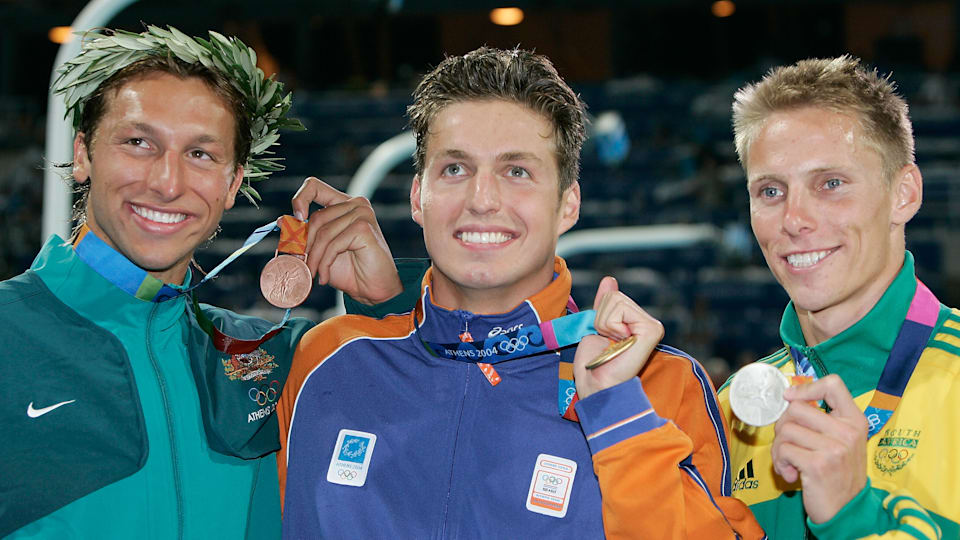
Pieter van den Hoogenband won three Olympic freestyle gold medals but is also famous for being part of swimming's Race of the Century, the 200m freestyle final at Athens 2004.
The Dutchman took silver behind Ian Thorpe, finishing ahead of Michael Phelps with Klete Keller in fourth and Grant Hackett fifth.
Out of the top five in that race, van den Hoogenband is the only one not to suffer from depression or serious mental health issues.
Now 40, Olympic Channel caught up with 'Hoogie' to talk about his career and life after swimming.
Pieter VAN DEN HOOGENBAND
There's a real contrast between how athletes, particularly male athletes, approach a race with the testosterone flowing. You always seemed to be amazingly calm before a race. How did you manage it?
In Olympic final and in all finals, you have to control your emotions. Because if you don’t control them, you are not in control of your performance.
Of course, when I was younger I was more reckless, I was more wild. You have to find a way that is good for you and helps you to perform well. The testosterone, we all have it. We all have the same problem.
You control your emotions, you control your anger. But you need your anger at the end of the race. I found that when I was young. I was in my first Olympic final in Atlanta. I finished fourth because I could not control the excitement.
It was like I was a beast in a cage and they opened the cage and I went out so the first 25 metres, I gave everything. And that was a waste of energy because I was only one-tenth of a second faster than when I was relaxed.
I found out that if I could control my emotion in the first 25 metres, by the end of the race – if I could put the same amount of energy in the last part of my race – I was maybe 1.5s faster than I was normally.
I read Adam Peaty (Olympic 100m breaststroke champion) say that his best performances come when he swims angry. And I was like, "Oooh, that's interesting." But actually it's more about controlled anger. You have to channel it. Especially in something like breaststroke where your technique is so important.
I used to swim with a lady called Inge de Bruijn (four-time Olympic champion). She needed the anger like Peaty. Her race was a fight, a fight against her opponents. Some athletes needed that negative energy. But I am different.
Looking at the 'Race of The Century' again, it's interesting that four of the top five have suffered from mental health issues in the years since. Why are you the odd man out?
I never felt the urge to compete or to get back into the water. I was glad for it and I was happy to feel like that. But I can understand when people still have that feeling. It is possible that you will have some mental struggle because you have to say goodbye to your biggest passion.
I am a very curious person so swimming was everything to me for a period of time. But when swimming was over I was so happy to develop myself and find different things to improve and stay curious.
When your career is over, your life is not over. And you are not a medal.
Every day you are training and you are Olympic champion... it’s not once every four years, it’s every day. And when that way of living is over you need to try something new.
Those guys came from big well-known countries in the world of swimming, Australia and the US. I am from a rather small country so I also had to organise my success all by myself like a company. I was the manager of my own company with all kinds of specialists with the whole team around me.
It was my biggest passion. But when it was over, it was over for me. I never looked back.
What advice would you give to young athletes at the start of their career?
Stay honest. Honest to yourself and to your coach. We were always honest. You need feedback in order to become better but stay honest. Because... "Am I that good?"
If you want to find answers you have to find the right questions. "What am I good at?" It was swimming. Swimming was my biggest passion. This is what I wanted to do. This is the answer.
You make an appointment with yourself – no matter what happens this is what you want to do. You have to make this choice and accept the consequences. You have to accept the consequences if you want to become a world-class swimmer at the Olympics.
For my kids, I use the slogan from the Olympics in London. I think it’s the best slogan ever - 'Inspire a Generation'.
Whatever I do as a dad, I want to give them inspiration and guide them well and help them to make the right choices.
Pieter van den Hoogenband and Michael Phelps were this week’s big interviews on the Olympic Channel Podcast. Each Wednesday we find for you the very best Olympians and ask them to go in deep about the biggest Olympic talking points. We want you to think just like an Olympian.
